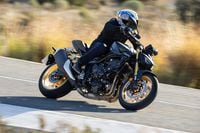In 1991 the soviet union disbanded, Terminator 2 hit theaters, and Claudio Domenicali began working at Ducati with a freshly minted diploma in mechanical engineering from the nearby University of Bologna. He first became prominent to race fans in 1999 when he was promoted to run Ducati Corse, overseeing a flourish of success in World Superbike—and eventually MotoGP—that has come to define the brand in the modern era. He rose through the ranks and was named CEO in 2013, 22 years after joining the company.
1. When did you first become interested in motorcycles?
I started as a kid. Basically, I was interested in mechanics in general. Boats, go-karts, cars… And when you are 14 the only thing you can ride is a motorcycle. You cannot drive a car, and so I started with a motorcycle. I was more passionate about building them than just riding. I already had an interest in assembling, disassembling, and tuning. So I ended up with the idea of becoming an engineer, based on that.
2. Why Ducati?
Actually, I was studying mechanical engineering and I lived in Bologna already. And so the main reason for Ducati was it was a motorcycle company and nearby my house. But at the time that I was first interested in bikes Ducati was in the mid-1980s and was not very good. The technology of the bikes was very much lagging behind. When I entered the company they already made the water-cooled, eight-valve twin cylinder for superbike. That was a step, you know? Because before, the twin was just a bit old and lazy. It was very torquey, very good for a mountain road, but not for the racetrack. It was a small company at that time—very, very small. The total number of engineers was three, including me. Now, we have 300. So the company was 100 times smaller in terms of engineering.
3. The United States is a big market. Do you think Ducati would go racing in the US again, whether it's superbike or flat-track or any other discipline?
We are willing to support private teams that want to race in the national championships, like in the UK for example. That is a possibility in the US, for sure, and we would be very happy. As a direct factory effort, we want to concentrate on MotoGP and World Superbike.
MotoGP is very expensive, yes, but there is a very big return in technology. The engine that we will introduce next year is a V-4. It’s very closely derived from everything we’ve done in the last 10 years in MotoGP. And there are a number of tricks inside—like the pumps, the crankshaft, the desmo system—that are very, very, very special. There is nothing similar in production.
4. What is it about Italy that produces such charismatic machines?
I think it's a matter of what you call "districts"—an area in which there is some specific expertise. And in Emilia-Romagna, where Bologna is, you have Ducati, Ferrari, Lamborghini, Maserati, Dallara. It's a district in which race technology has a long history. And so, it's a kind of chicken and egg. The more you have companies, the more you get people from outside, the more universities there are. It's like Silicon Valley. Why is it there? It started there and then…you know. It's a "district" as well.
5. If you could go anywhere and ride anything, where would you go and what would you ride?
On track: I think that Mugello is something almost unbeatable. It's the up and down and the nature around. It's in an incredible valley—there's the smell, the perfume of the mountains—and it's very calm. There is no noise. And then in a moment you fire up a motorcycle. It's a big emotion. And there is nothing better than the Superleggera. A Superleggera there [at Mugello] is… I mean, it's kind of like having sex with the motorcycle. It's something so strong, emotionally, so powerful.
Off track: I would go with a Multistrada Enduro in South America—in Chile or Argentina—that’s a place where I think it would be very nice to go.










/cloudfront-us-east-1.images.arcpublishing.com/octane/2AHGIKOGQPIPCGKA4YZZPWP5QE.jpg)
/cloudfront-us-east-1.images.arcpublishing.com/octane/2WF3SCE3NFBQXLDNJM7KMXA45E.jpg)
/cloudfront-us-east-1.images.arcpublishing.com/octane/G4MG6OUCJNBSHIS2MVVOTPX65E.jpg)
/cloudfront-us-east-1.images.arcpublishing.com/octane/IIGGWFOTOJGB7DB6DGBXCCMTDY.jpg)
/cloudfront-us-east-1.images.arcpublishing.com/octane/QSTCM6AVEZA5JJBUXNIQ3DSOF4.jpg)
/cloudfront-us-east-1.images.arcpublishing.com/octane/U4I7G625B5DMLF2DVIJDFZVV6M.jpg)
/cloudfront-us-east-1.images.arcpublishing.com/octane/B6XD6LS6IVCQPIU6HXDJSM3FHY.jpg)
/cloudfront-us-east-1.images.arcpublishing.com/octane/ICL63FEDDRDTTMINYICCEYGMDA.jpg)
/cloudfront-us-east-1.images.arcpublishing.com/octane/FCGZHQXRBZFLBAPC5SDIQLVF4I.jpg)
/cloudfront-us-east-1.images.arcpublishing.com/octane/WNOB6LDOIFFHJKPSVIWDYUGOPM.jpg)

/cloudfront-us-east-1.images.arcpublishing.com/octane/X33NU3E525ECRHXLNUJN2FTRKI.jpg)
/cloudfront-us-east-1.images.arcpublishing.com/octane/6KKT5NNL2JAVBOXMZYS5ZO76YA.jpg)
/cloudfront-us-east-1.images.arcpublishing.com/octane/J5RKG5O455GMPGQRF2OG6LRT7A.jpg)
/cloudfront-us-east-1.images.arcpublishing.com/octane/GX2CIZKQVRH2TATDM26KFG2DAE.jpg)
/cloudfront-us-east-1.images.arcpublishing.com/octane/ZWIDYSAKQZHD5BHREMQILXJCGM.jpg)
/cloudfront-us-east-1.images.arcpublishing.com/octane/CYUHJZCTSJCH3MRAQEIKXK7SCQ.jpg)
/cloudfront-us-east-1.images.arcpublishing.com/octane/LKOFINY56FCXJCANJ5M7ZDQUBY.jpg)
/cloudfront-us-east-1.images.arcpublishing.com/octane/4NBPDACMWJH63JQYJVK3QRBDZI.jpg)
/cloudfront-us-east-1.images.arcpublishing.com/octane/KKHQHRR3FJGX7H2IPU6RALMWG4.jpg)

/cloudfront-us-east-1.images.arcpublishing.com/octane/5IOFS5JAE5FOXMNA23ZRAVVYUU.jpg)
/cloudfront-us-east-1.images.arcpublishing.com/octane/CGXQ3O2VVJF7PGTYR3QICTLDLM.jpg)

/cloudfront-us-east-1.images.arcpublishing.com/octane/OQVCJOABCFC5NBEF2KIGRCV3XA.jpg)